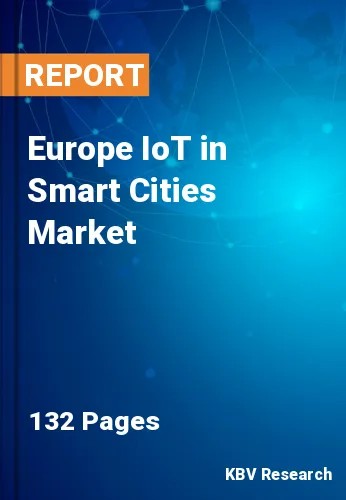The Europe IoT in Smart Cities Market would witness market growth of 17.8% CAGR during the forecast period (2021-2027).
As a result of the growing population and rising urbanization, the need for long-distance infrastructure has become a major growth element. Smart city projects in areas like safety, transportation, and utility management are being implemented by governments all around the world to address these concerns. Moreover, factors such as increased traffic congestion and greenhouse gas emissions are projected to boost the use of energy management and smart mobility technology.
Despite the fact that smart city initiatives involve the use of intelligent sensors and a wide range of technologies, the applications may vary by project. It also differs from city to city and community to community. Due to the necessity to develop a sharing economy, preserve energy, and improve resilient cities, the global smart cities industry is also thriving in the global economy.
London and Bristol are the leading countries in adopting smart city solutions, according to the Huawei UK Index. The region is witnessing many initiatives with respect to smart cities. For example, the European Union established many financial programmes in 2017 to promote the development of smart cities throughout Europe. The government has launched the 'SET Plan' and the '7th Framework Programme' for research in order to accelerate the implementation of smart cities in the European region. Similarly, the Federal Ministry of Transport, Innovation and Technology (BMVIT), as well as the Climate and Energy Fund, are heavily investing in the development and implementation of smart city programmes in Austria.
The Urban Platform initiative represents the way in which European cities foster better society outcomes through an interaction designed to improve knowledge and management within large volumes of city data, making a further connection with the sharing of this data and the improvement of city services through the European Innovation Partnership for Smart Cities & Communities (EIP SCC). Moreover, the CAPSELLA project (Collective Awareness Platforms for Environmentally Sound Land Management) is an evolutionary ICT application of smart cities urban management based on data technologies and sustainable agri-food systems.
The Germany market dominated the Europe IoT in Smart Cities Market by Country 2020, and would continue to be a dominant market till 2027; thereby, achieving a market value of $20.7 billion by 2027. The UK market is estimated to witness a CAGR of 16.9% during (2021 - 2027). Additionally, The France market would grow at a CAGR of 18.7% during (2021 - 2027).
Based on Component, the market is segmented into Solution and Services. Based on Solution Type, the market is segmented into Remote Monitoring, Data Management, Security, Real-time Location System, Reporting & Analytics, and Network Management. Based on Services type, the market is segmented into Professional Services and Managed Services. Based on Application, the market is segmented into Smart Citizen Services, Smart Building, Smart Transportation, and Smart Utilities. Based on countries, the market is segmented into Germany, UK, France, Russia, Spain, Italy, and Rest of Europe.
Free Valuable Insights: The Global IoT in Smart Cities Market Size will Hit $347.6 Billion by 2027, at a CAGR of 18.8%
The market research report covers the analysis of key stake holders of the market. Key companies profiled in the report include IBM Corporation, Schneider Electric SE, Siemens AG, Microsoft Corporation, Intel Corporation, Hitachi, Ltd., Tech Mahindra Limited, Huawei Technologies Co., Ltd. (Huawei Investment & Holding Co., Ltd.), Robert Bosch GmbH, and Honeywell International, Inc.
By Component
By Application
By Country
Our team of dedicated experts can provide you with attractive expansion opportunities for your business.

